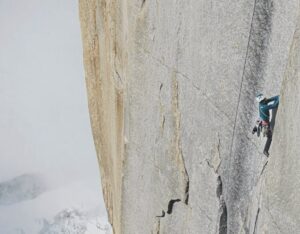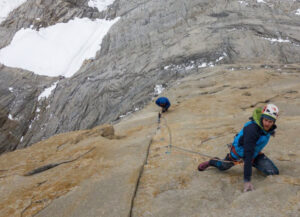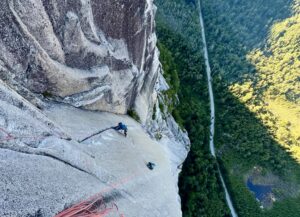If you’re hooked from the tight 15-second intro to this prototype adventure film, then fill your blue-enameled coffee cup and get ready for an emotive — but at times tough-to-swallow — experience.
Diligent filmmaking, a groovy 1968 rock ‘n’ roll soundtrack, and a story no one had ever tried to tell before are the main ingredients. Watch Yvon Chouinard and friends wave goodbye to the sparkling sunshine of California and plunge south to Patagonia. Almost 60 years later, their Fitz Roy dreams seem as old-fashioned as the Super 8 footage in Mountain of Storms.
It’s hard for any of us to imagine having more fun: adventuring with our closest friends through colorful landscapes, visiting unfamiliar cultures, and generally harboring no other cares in the world.
That said, it’s easy to see the fractals of the Chouinard/Patagonia mythology right through the images on screen. You could copy and paste many of Chouinard’s most famous quotes into the movie’s tagline without a seam showing.
“A master in the art of living draws no sharp distinction between his work and his play; his labor and his leisure; his mind and his body; his education and his recreation. He hardly knows which is which,” he wrote in Let My People Go Surfing.
The bad: photogenic but problematic
Be advised, too, that the film is anachronistic by definition: it belongs to a period other than the one in which it now exists. So it’s peppered with moments, especially narrative quips, that are cringey at best or colonial at worst.

Tompkins having his “fortune read” at a stopover. Photo: Screenshot
“South America demands patience. Down here, the clocks don’t run; they walk.”
Dick Dorworth, the jock skier of the group, later “teaches” locals about turns while they’re sand skiing. “Instead of just ‘scooting’ down the dune, try some of these linked turns,” the narrator scolds. “Snow skiers have been doing them for years.”
While not shocking for a document from 1968, the framing of this and other episodes did leave me with a sour taste. I enjoy knowing that different skiing styles can prevail in opposite hemispheres of the planet. But I don’t need to be spoon-fed a story about how Dorworth “taught” the locals (who remain faceless and unnamed) his own way — especially when there’s no indication from the footage that that’s what he’s actually doing.

(Staged) Dorworth preparing to straight-line a slope in Portillo, Chile to set the world record for speed skiing, after “teaching” locals not to straight-line. Awkwarrrd…. Photo: Screenshot
Even the socially sympathetic notes of Mountain of Storms can clash.
For our troupe of long-hairs, “a haircut can save trouble at South American borders.”
What about at U.S. borders or any other state jurisdictional boundary in the world?
The good: carefree and non-commercial
But — if you are willing or able to negotiate these embedded narrative stumbling blocks, other aspects sparkle. The unhurried pacing of the adventure is a breath of cool mountain air.
When Chouinard and his companions run into scheduling conflicts, they just stop and wait for a few days. They often amuse themselves with side quests. And — whether it’s staged or not, wink wink — when one companion’s plans fall through and he misses the boat, he gamely hitchhikes to a spot on the only road south, where he knows they will be forced to pass him on the drive.

Chouinard and Co.’s Patagonia dream machine. Photo: Screenshot
The non-commercial flavor of it all is quaint. Most current adventure films insist on story-building and anticipation, and some become overt and codified. For these reasons, I found Mountain of Storms refreshing.
Hang tight, too, for the climbing footage, which is top-notch entertainment. The climbers explore a sun-splashed alpine world as overdubbed wind whistles and howls on the soundtrack.

Photo: Screenshot
The takeaway: positive progress
I’ll leave the climbing footage to speak for itself.

No, I’m not cold. Are you? Photo: Screenshot
Highlights:
- Climbing 40˚ snow with a straight-shaft ice ax and no gloves.
- Close-up of Chouinard pounding a piton so deep into a perfect finger crack that the pommel flattens.
- Nobody ever wears a helmet, on what turned out to be a Grade VI first ascent.
And in case anybody averse to the regressive social overtones is still reading: a sunny California “dream” sequence where an attractive blonde woman goes climbing — in a bikini that could be underwear, with a normally clothed Tompkins.
There’s no arguing Mountain of Storms captured imaginations in its day. But I’m glad that adventure films now can inspire so many more different kinds of them.






